Materials & News "EU Carbon-free economy: best practices for Ukraine" (2021 year)
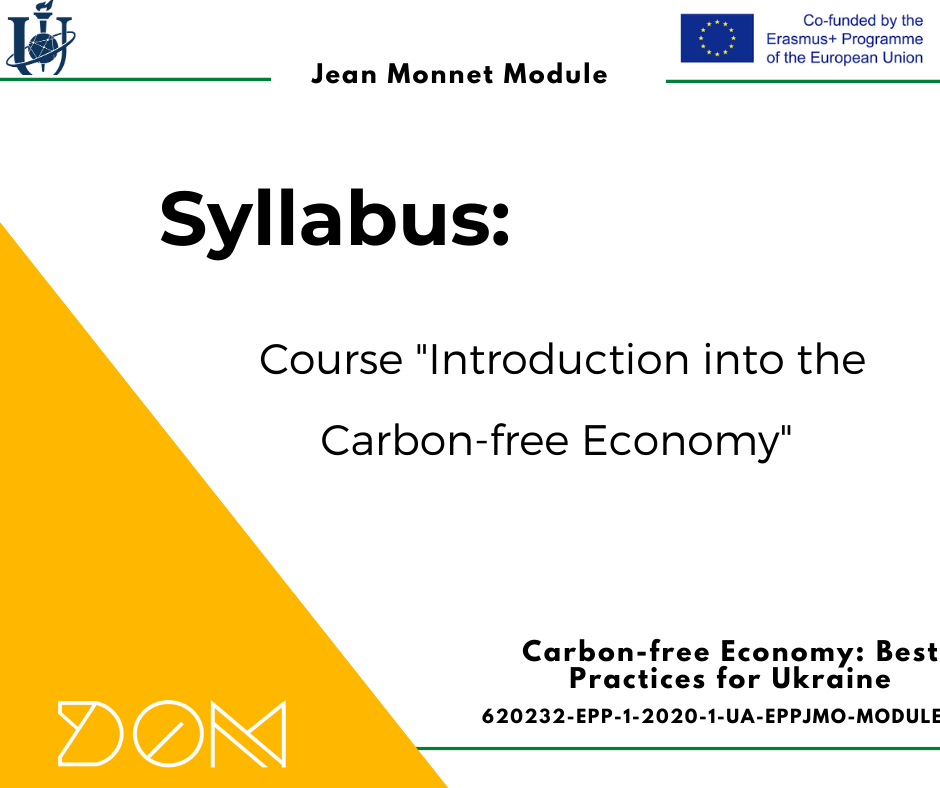
Elective course syllabus "Introduction into the Carbon-free Economy"
As part of the implementation of the project “Carbon Neutral Economy: Best Practices for Ukraine” (620232-EPP-1-2020-1-UA-EPPJMO-MODULE), funded by the European Commission, a training course syllabus was developed «Introduction into the Carbon-free Economy». The authors of the course are Tatyana Pimonenko and Oleksii Lyulyov. It should be noted that this training course is taught to students of all specialties, and upon completion, all students will receive appropriate certificates.
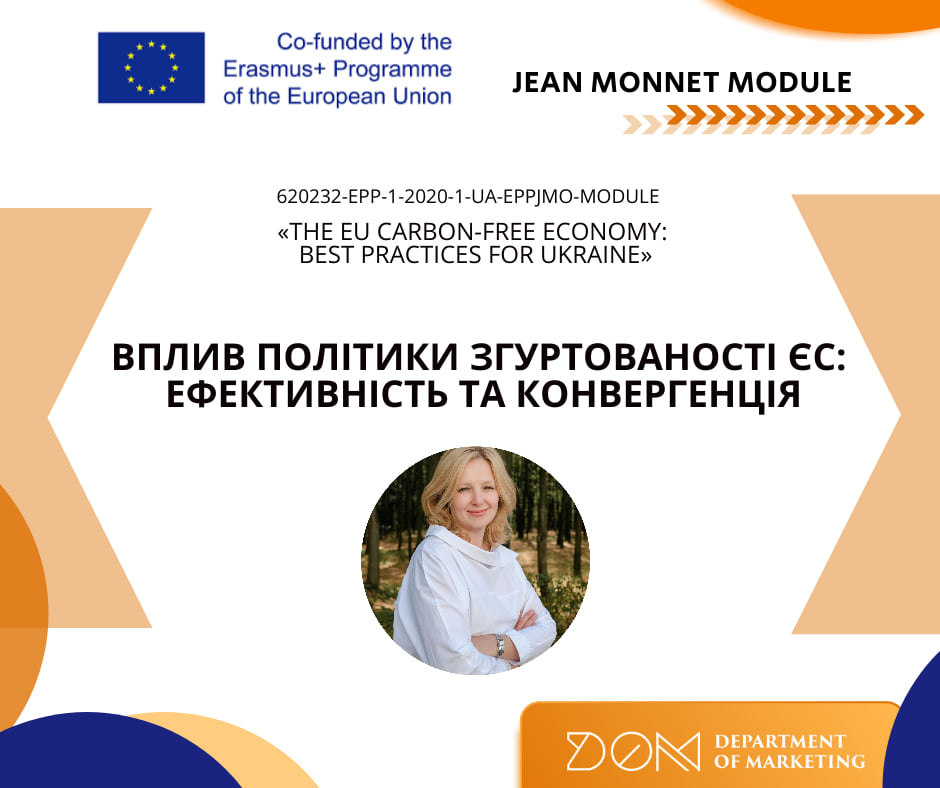
IMPACT OF EU COHESION POLICY: EFFICIENCY AND CONVERGENCE
The new academic year for bachelors in the Marketing specialty began with new seminars within the framework of the Jean Monnet project “Carbon Neutral Economy: Best Practices for Ukraine” (620232-EPP-1-2020-1-UA-EPPJMO-MODULE).
Olena Chygrin held a seminar on the topic “The Impact of EU Cohesion Policy”, in which she spoke about various aspects of the implementation of EU cohesion policy: efficiency, convergence, inequality, governance and many others.
The study of the experience of individual (France, Greece, Romania) European countries in order to identify cause-and-effect relationships between cohesion policy and economic growth was especially useful.
The participants in the discussion tried to answer the questions: did the programs implemented by the regions achieve their targets? What were they intended for? Did what they achieved meet the needs of the regions?
Students were interested in the experience of France in the project “Regional Development Program – Bourgogne” within the framework of which sustainable and inclusive growth measures were implemented.
The experience of Greece in promoting social cohesion was considered using the example of the program “Education for Human Resources Development and Lifelong Learning”, the purpose of which was to reduce unemployment, create new opportunities for quality education, advanced training and sustainable employment for all.
The example of Romania was considered using the “Large Infrastructure Operational Program (LIOP)”, the main purpose of which was to promote sustainable economic growth and safe and efficient use of natural resources. The implementation of the project solves development problems identified at the national level in terms of transport infrastructure, development of sustainable urban transport, environmental protection and the introduction of green energy.
Based on the results of the lecture-discussion, the students summarized the main problematic issues of sustainable and inclusive development of the Sumy region.
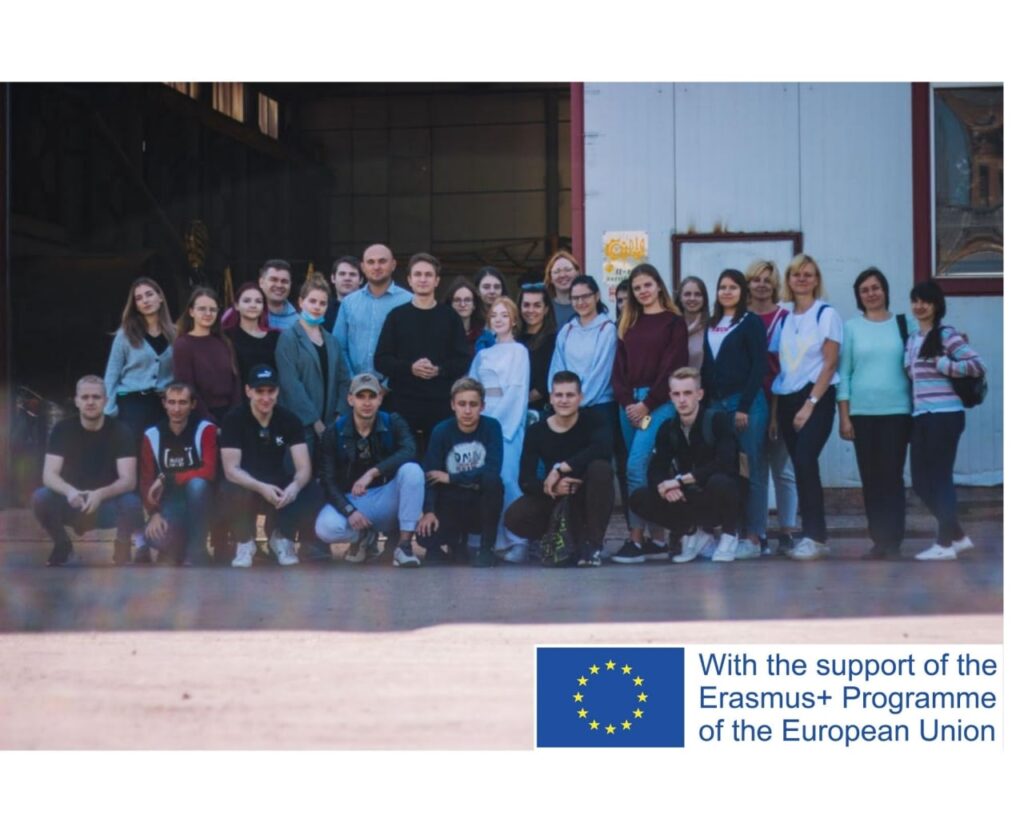
COMMUNICATION THAT INSPIRES
As part of the Erasmus+ Jean Monnet project “EU Economy Without Carbon: Best Practices for Ukraine”, on September 9, 2021, marketers (groups Mkm-11, En-92/2mk, En-92/5mk-o, Mk-81/1, Mk-81/2-9) conducted field practical-oriented training sessions at the modern enterprise “Kobzarenko Plant” (Lypova Dolyna, Sumy region).
The enterprise “Kobzarenko Plant” is a leader in Ukraine in the production of tractor agricultural trailers, the product range of which includes more than 100 items, and the international geography of sales includes more than 40 countries of the world.
When familiarizing themselves with the features of production, commercial and marketing activities, the students met with the director of the enterprise, Dmitry Kobzarenko, who spoke about the practices of sustainable entrepreneurship and the implementation of innovative environmentally friendly programs at the enterprise:
-implementation of lean manufacturing projects;
-involvement of the enterprise’s personnel in the generation of ideas and implementation of green projects;
-introduction of alternative energy;
-implementation of waste-free production and recycling;
-optimization of the cost structure at the enterprise.
Sales Manager Yevgeny Khrystenko spoke about the features of organizing marketing activities at the enterprise: forming the enterprise’s brand, promoting the enterprise’s products on the domestic and international markets, introducing digital technologies in marketing activities, creating the enterprise’s advertising products.
We sincerely thank Dmitry Kobzarenko and Yevgeny Khrystenko for their openness and high professionalism, and for the opportunity to conduct practically-oriented classes at the enterprise “Kobzarenko Plant”.
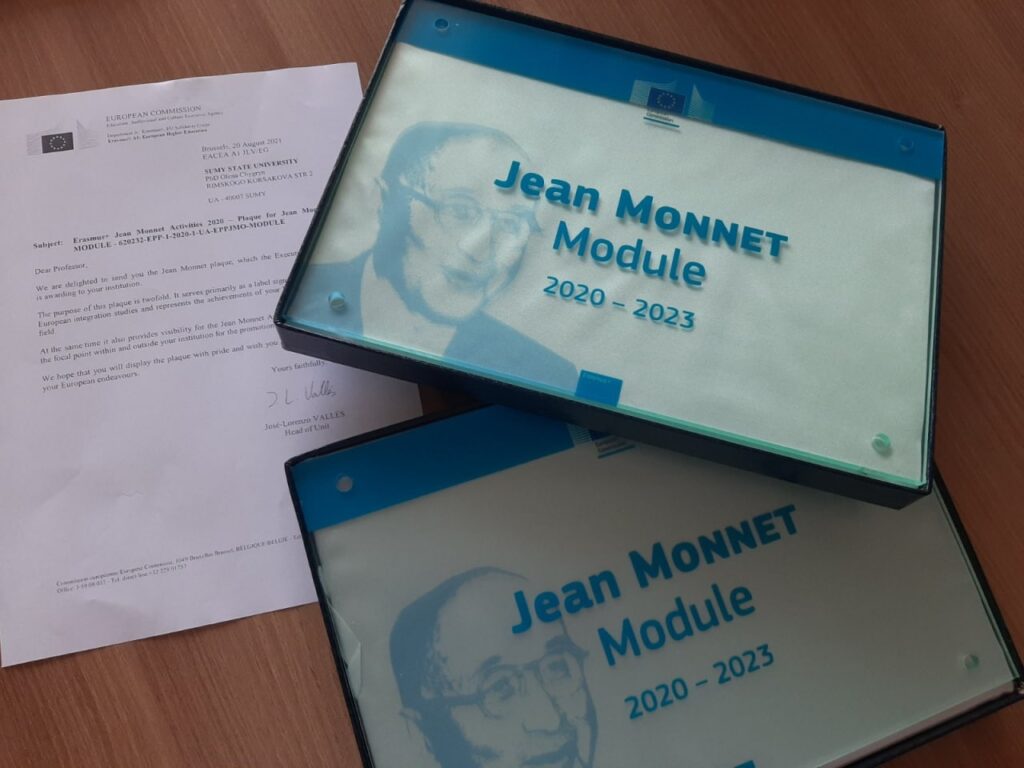
MARKETING AWARD FROM THE ERASMUS+ PROJECT
The Department of Marketing received honorary plaques from the European Commission, which recognize the high level of quality of the implementation of the winning projects: promotion of the ideas and values of the European Union, ensuring transparency in the implementation of project tasks, diverse representation of their results and achievements.
Since 2020, the Department has been implementing two modules within the framework of the Erasmus+ Jean Monnet program ✅ “European Policy for Small and Medium-Sized Enterprises” (head Pimonenko T.V.) and ✅ “EU Carbon-Free Economy: Best Practices for Ukraine” (head Chygrin O.Yu.).
Lectures, seminars, trainings, field trips, and excursions continue.
The Department of Marketing proudly accepts the awards received.
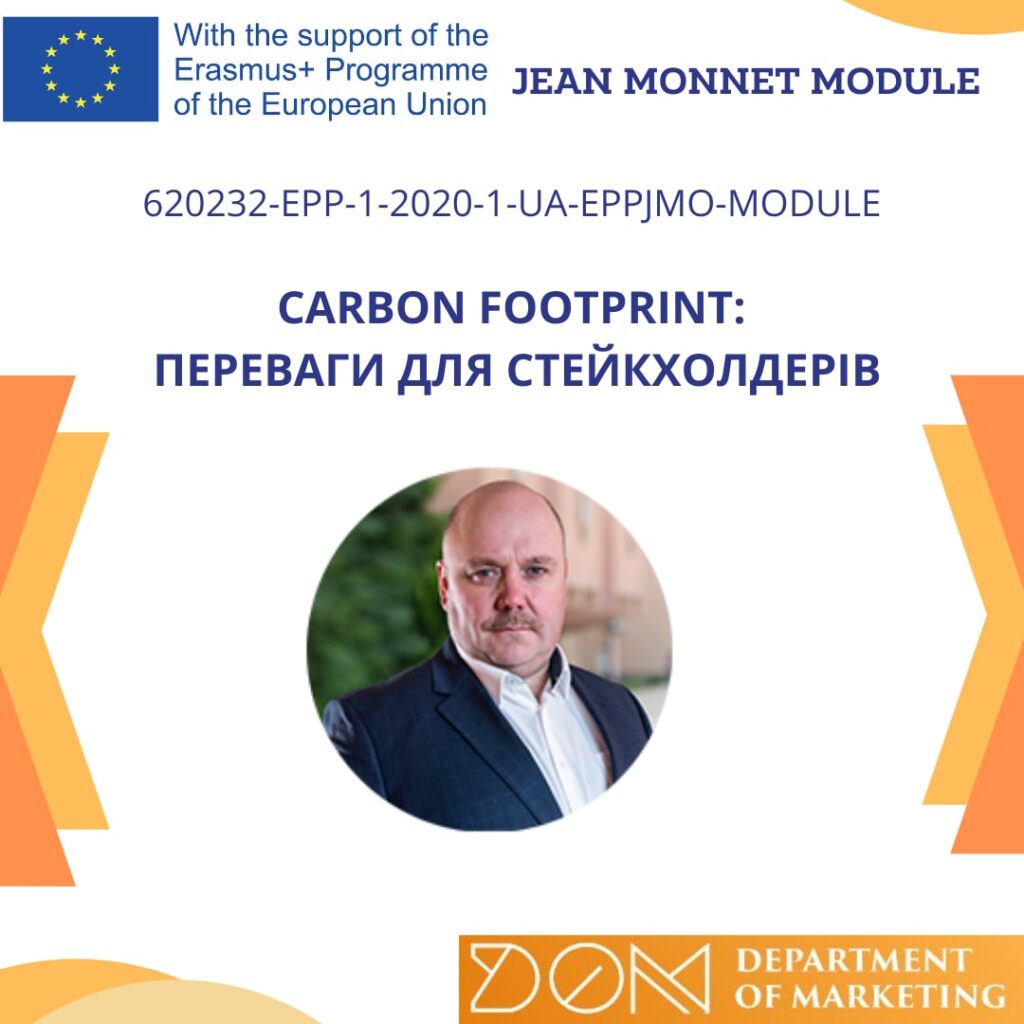
CARBON FOOTPRINT: STAKEHOLDER BENEFITS
Bachelors and Masters of the “Marketing” specialty continue to attend lectures and seminars within the framework of the Jean Monnet project “Carbon Neutral Economy: Best Practices for Ukraine” (620232-EPP-1-2020-1-UA-EPPJMO-MODULE)
On October 1, 2021, Sergiy Leonov held a webinar on the topic “Carbon footprint: benefits for stakeholders”, in which he spoke about the history of the term, levels of implementation, the category of biopotential, and the prospects for using the ecological footprint at the macro and micro levels.
The following questions were interesting for the listeners:
✔️ formation of an individual ecological footprint
✔️ who are “green” and “brown” consumers
✔️ how the decrease in the number of children, life without transport, refusal of travel and vegetarianism affect the ecological footprint
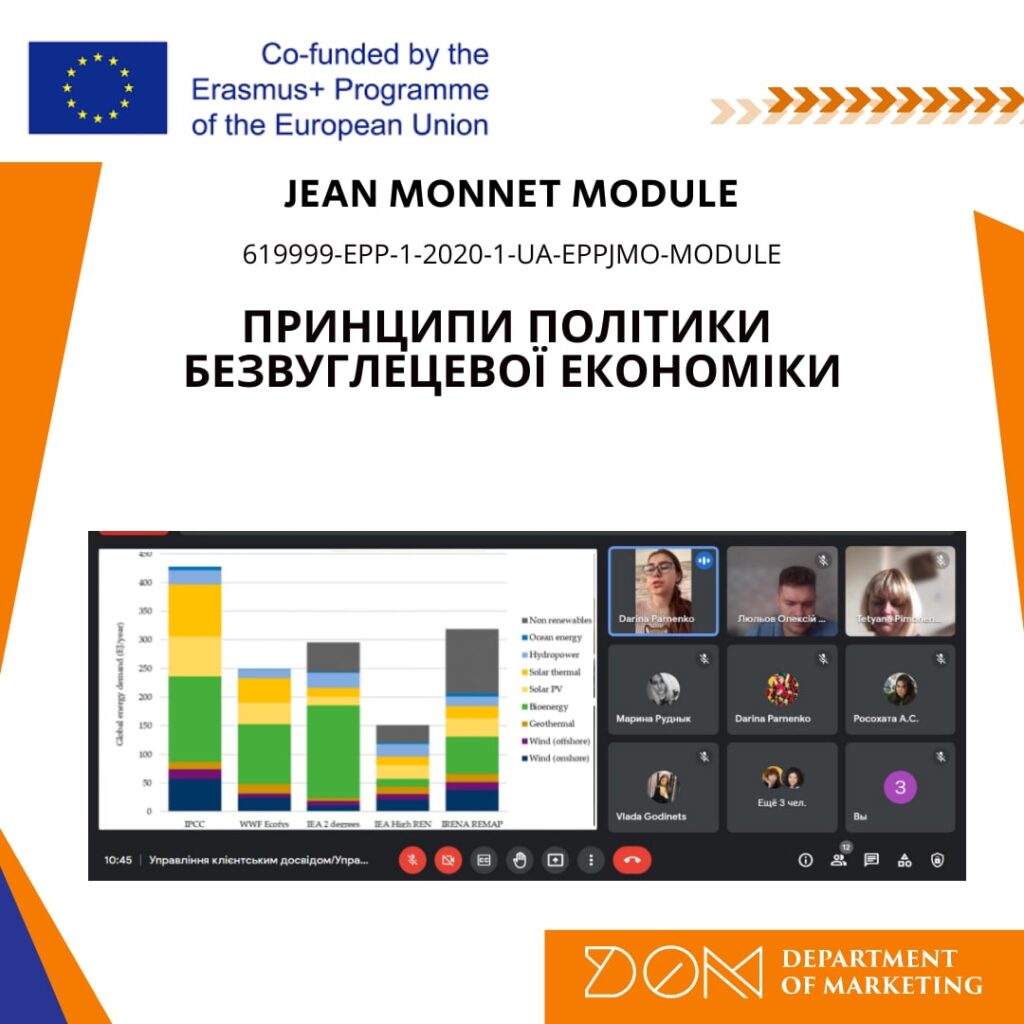
PRINCIPLES OF THE ZERO-CARBON ECONOMY POLICY
Marketers continue to implement the Jean Monnet project “Carbon Neutral Economy: Best Practices for Ukraine” (620232-EPP-1-2020-1-UA-EPPJMO-MODULE).
On October 12, 2021, Tetyana Pimonenko held a webinar for bachelor’s and master’s students in the specialty “Marketing”, dedicated to the main principles of implementing the European policy of a carbon-free economy.
The key issues of the webinar were: the principles of a carbon-free economy, the conditions for its formation, implementation mechanisms, financial support and green investment.
The listeners analyzed the features of the “green” transition of the domestic economy.
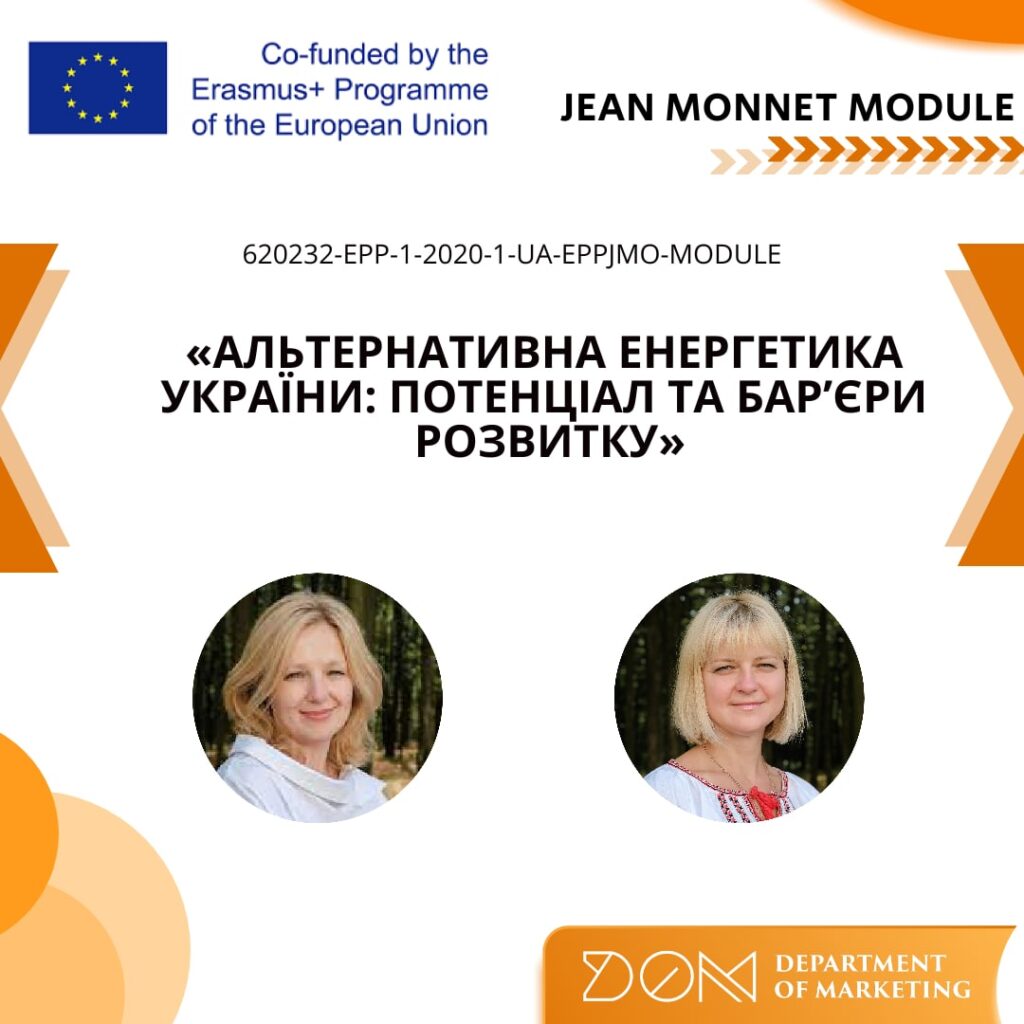
ALTERNATIVE ENERGY IN UKRAINE: POTENTIAL AND BARRIERS TO DEVELOPMENT
Marketers continue to give lectures within the framework of the Jean Monnet project “Carbon Neutral Economy: Best Practices for Ukraine” (620232-EPP-1-2020-1-UA-EPPJMO-MODULE)
On October 26, 2021, Olena Chygryn and Pimonenko Tetyana told bachelor’s students of the “Marketing” specialty about the features of the development of alternative energy in Ukraine.
The key issues of the lecture were:
✔️ Energy Strategy of Ukraine until 2035: key targets
Analysis of energy production from renewable energy and the pace of its development
Pace of development of alternative energy in the EU
Development of solar and wind energy in Ukraine
Biomass potential
The issues of using alternative energy sources at the level of individual households and the features of the implementation of green tariffs were interesting for the listeners.
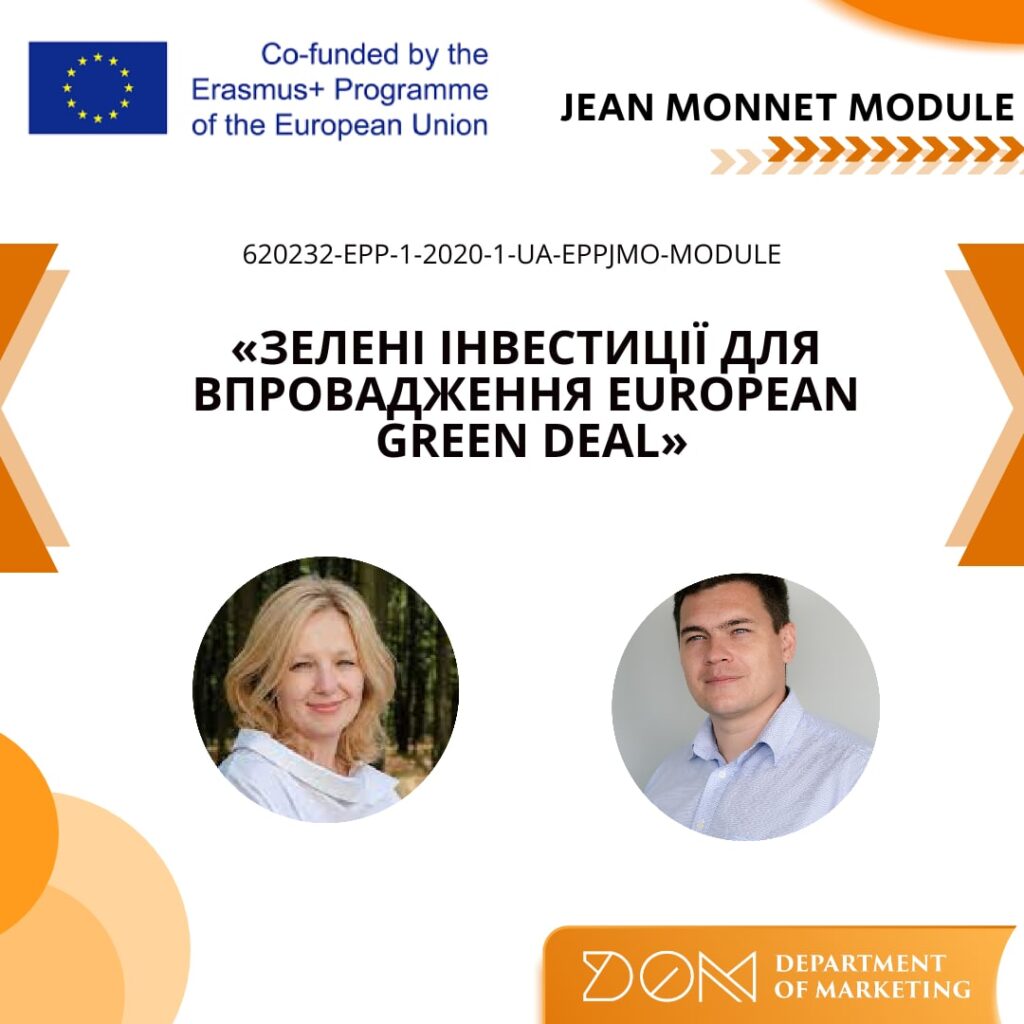
GREEN INVESTMENTS FOR THE IMPLEMENTATION OF THE EUROPEAN GREEN DEAL
The Department of Marketing is currently implementing the Jean Monnet project “Carbon Neutral Economy: Best Practices for Ukraine” (620232-EPP-1-2020-1-UA-EPPJMO-MODULE) ⚡️
On November 9, 2021, Olena Chygryn and Oleksii Lyulyov conducted an online seminar for bachelors and masters of the Marketing specialty on the impact of green investment on achieving climate neutrality.
The main issues of the lecture were:
✔️ global trends in green investment
✔️ public awareness and green investment
✔️ current state and main obstacles to the implementation of green investment policy in Ukraine
✔️ mechanisms and tools of green investment policy in Ukraine
The main issues discussed were the main components and specific measures that form the roadmap for attracting green investment in Ukraine and how it is related to the general investment climate in the country.
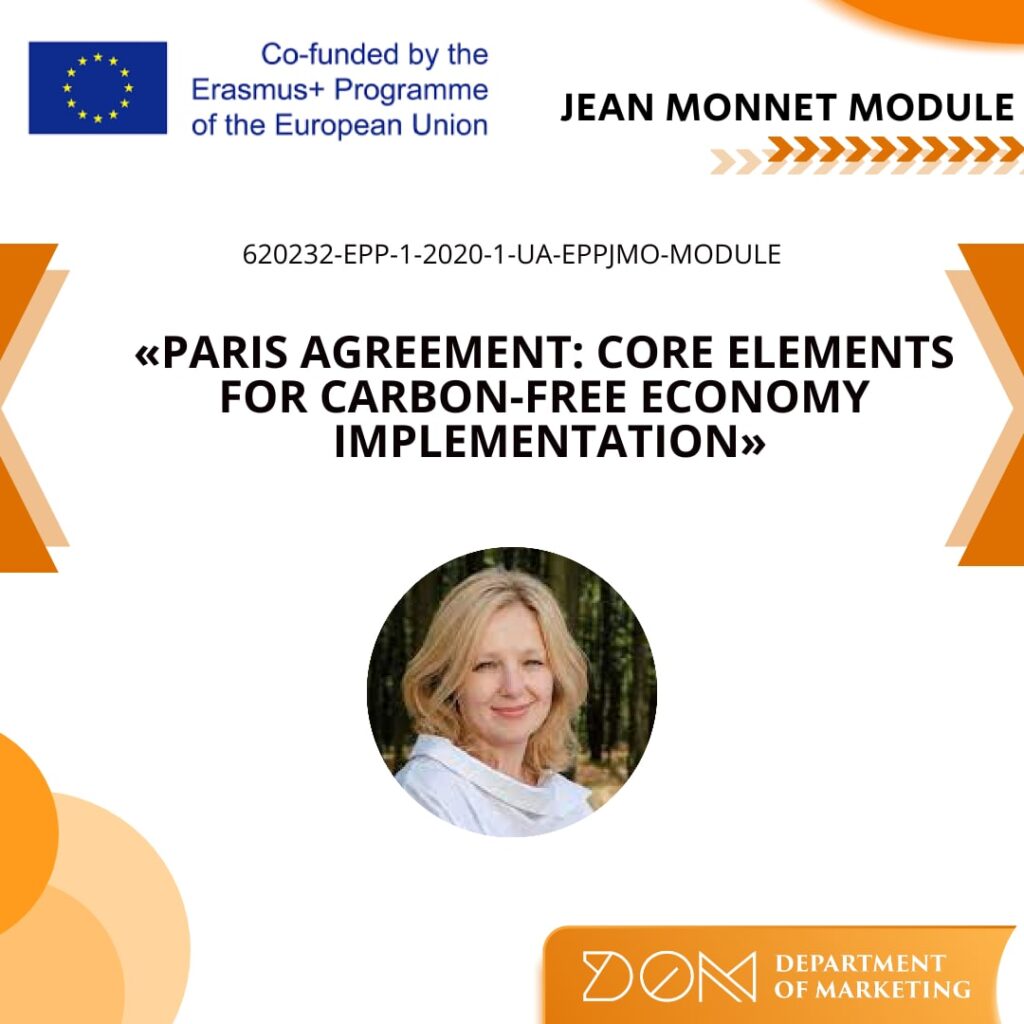
PARIS AGREEMENT: KEY ELEMENTS FOR IMPLEMENTING A CARBON-FREE ECONOMY
The Department of Marketing continues to hold lectures within the framework of the Jean Monnet project “Carbon Neutral Economy: Best Practices for Ukraine” (620232-EPP-1-2020-1-UA-EPPJMO-MODULE) On November 23, 2021, Olena Chygryn conducted an online webinar for bachelor’s students majoring in “Marketing” on ways to implement the main ideas of the 2015 Paris Agreement.
The main issues of the lecture were:
- key targets of the climate agreement (reducing the risks of climate change, increasing the ability to adapt to negative impacts, balancing financial flows together with combating climate change);
- features of the participation of countries and their national contribution;
- “global verification” as monitoring the implementation of the Paris Agreement.
The discussion was prompted by the question of the main components of Ukraine’s climate goal and the main obligations to implement the Paris Agreement.
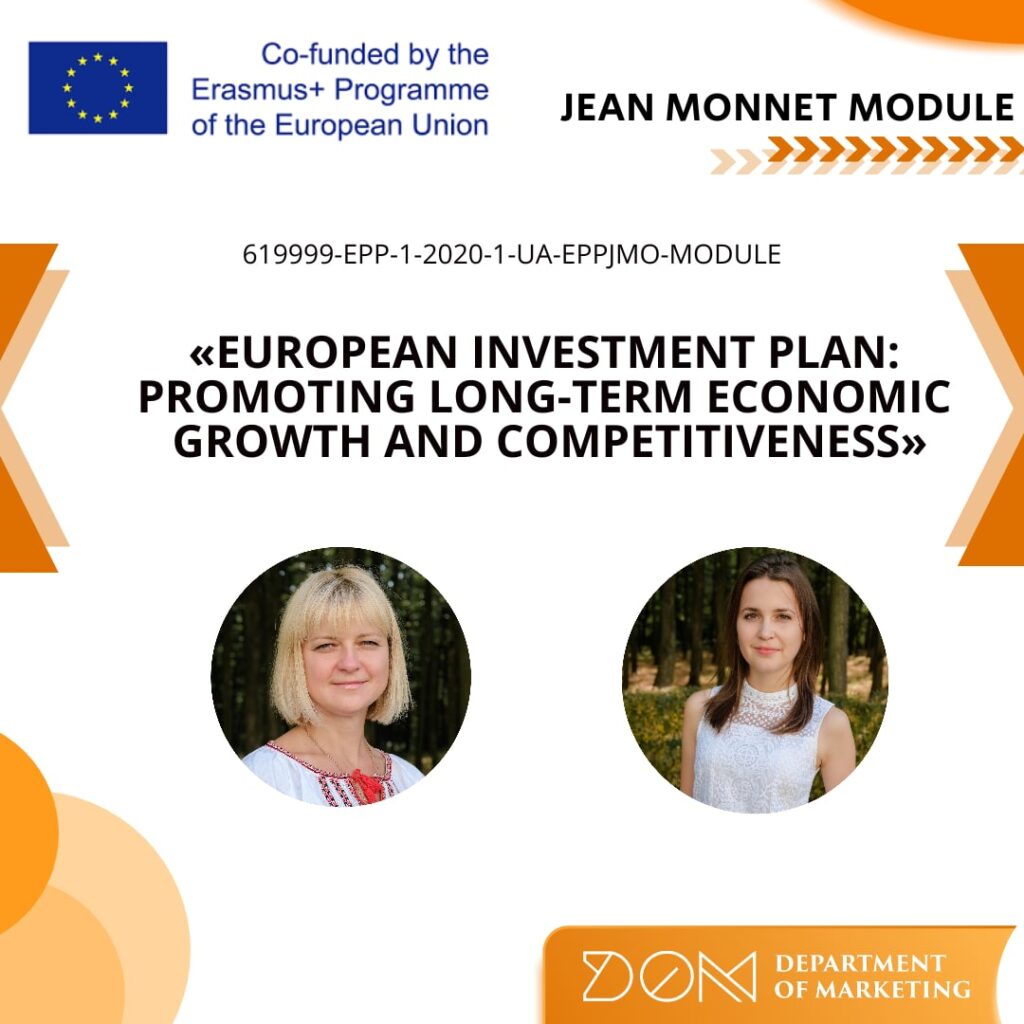
EUROPEAN INVESTMENT PLAN: BOOSTING LONG-TERM ECONOMIC GROWTH AND COMPETITIVENESS
Marketers continue to implement the Jean Monnet project “Carbon Neutral Economy: Best Practices for Ukraine” (620232-EPP-1-2020-1-UA-EPPJMO-MODULE) December 2, 2021 Tetyana Pimonenko and Yana Us held an online lecture for master’s and postgraduate students in the specialty “Marketing”. The meeting was dedicated to the specifics of the implementation of the Europe-2021-2027 investment plan.
The audience learned about the purpose of the fund and the basic areas of financing.
The exchange of views was devoted to the analysis of the areas of project financing, in particular, the development of sustainable infrastructure, research and innovation, investments in education and training, healthcare, information and communication technologies, and the development of renewable energy.
Special attention was paid to the criteria for selecting projects for financing and the prospects for the participation of domestic stakeholders in EU funding programs.
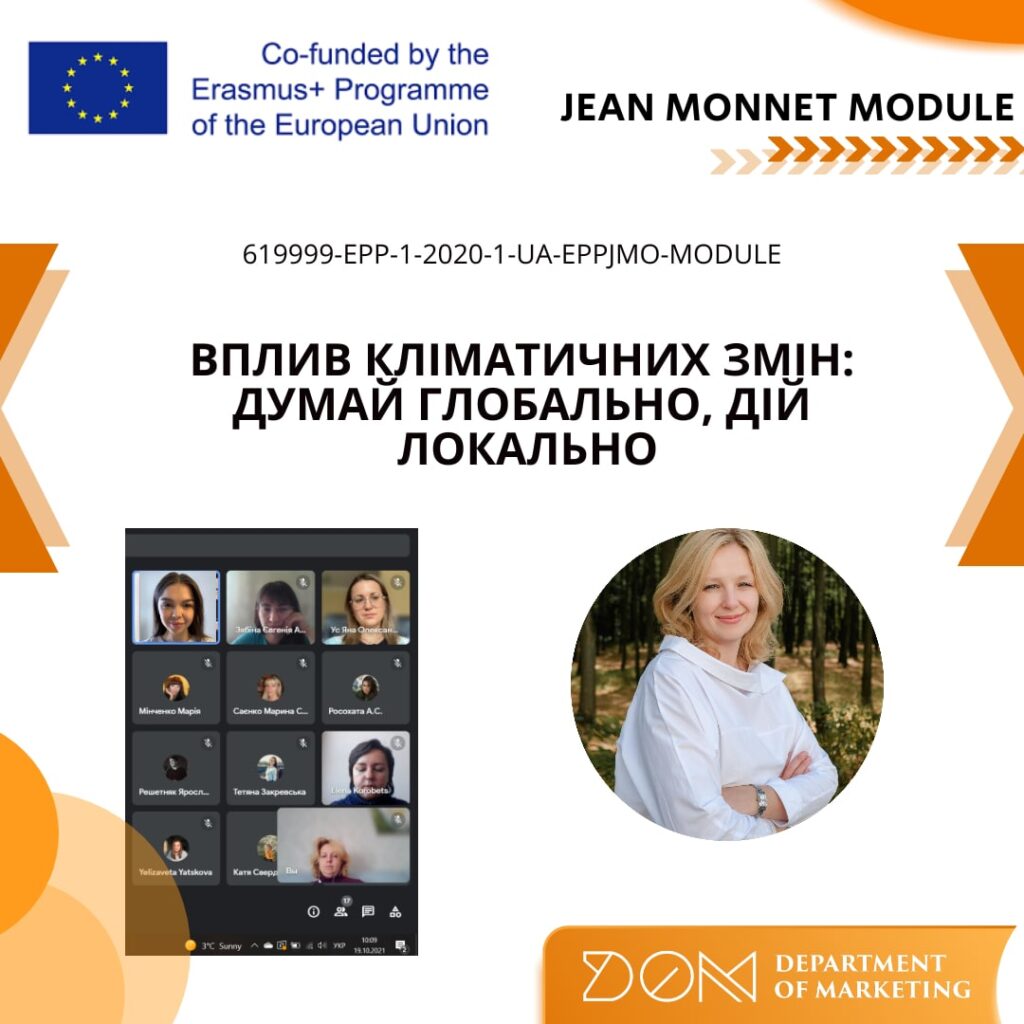
CLIMATE CHANGE IMPACT: THINK GLOBALLY, ACT LOCALLY
The beginning of October began for students of the Marketing specialty with a new training within the framework of the Jean Monnet project “Carbon Neutral Economy: Best Practices for Ukraine” (620232-EPP-1-2020-1-UA-EPPJMO-MODULE.
Associate Professor of the Department of Marketing Chygryn Olena conducted a training in which she spoke about the peculiarities of climate change in Ukraine and the world. The participants of the training discussed the causes and consequences of climate change, discussed priority measures to combat climate change.
To generate a system of measures within the framework of the principle “Think globally, act locally”, the students were divided into five groups
During the group work, the students proposed a list of priority actions that can be implemented at the local level.
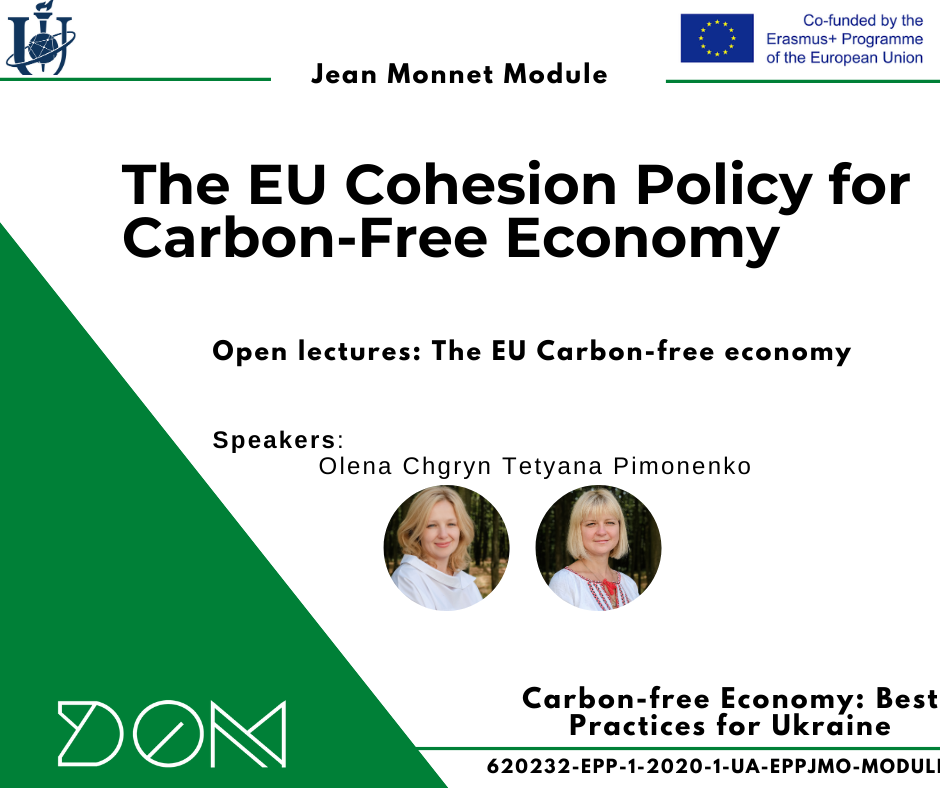
Open lectures within the framework of the European project «EU Carbon-free economy: best practices for Ukraine»
In April, Tetyana Pimonenko and Olena Chygryn conducted a series of open online lectures as part of the course “The EU Cohesion policy for Carbon-free economy”, which is implemented in accordance with the Jean Monnet Module “Carbon-neutral economy: best practices for Ukraine” (620232-EPP-1-2020-1-UA-EPPJMO-MODULE).
All lectures were divided into thematic modules, which, in addition to the theoretical part, also contained practical cases on the transition to a carbon-neutral economy. During the classes, the participants discussed the impact of climate change on the development of countries, the prerequisites for the transition to a carbon-neutral economy.
In addition, the students learned about the main goals and principles of a carbon-neutral economy within the framework of the EU Green Deal Policy. It should be noted that upon completion of the course “The EU Cohesion policy for Carbon-free economy”, students will receive certificates according to the learning outcomes.
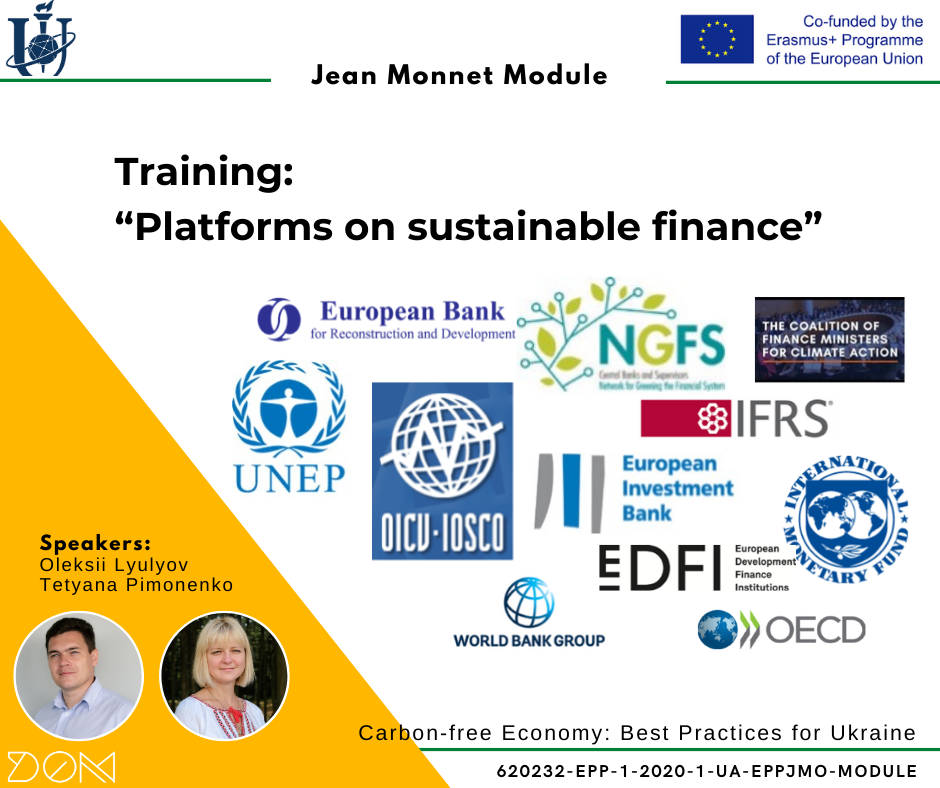
Workshop “The Carbon-free economy from the EU view”
The academic year began with a series of workshops “The Carbon-free economy from the EU view” where students were able to analyze the main principles and goals of a carbon-neutral economy, the role and importance of EU countries in global climate action using practical cases. Students identified Ukraine’s contribution to achieving carbon neutrality.
In addition, during the trainings, students identified gaps in harmonizing domestic regulatory and legal frameworks with the European one in the transition to a carbon-neutral economy. The participation of students from various specialties ensured a fruitful discussion and development of multidisciplinary solutions to the problems posed during the workshop.
The training was conducted within the framework of the Jean Monnet Module “Carbon-neutral economy: best practices for Ukraine” (620232-EPP-1-2020-1-UA-EPPJMO-MODULE). All participants of the training received certificates according to the results.
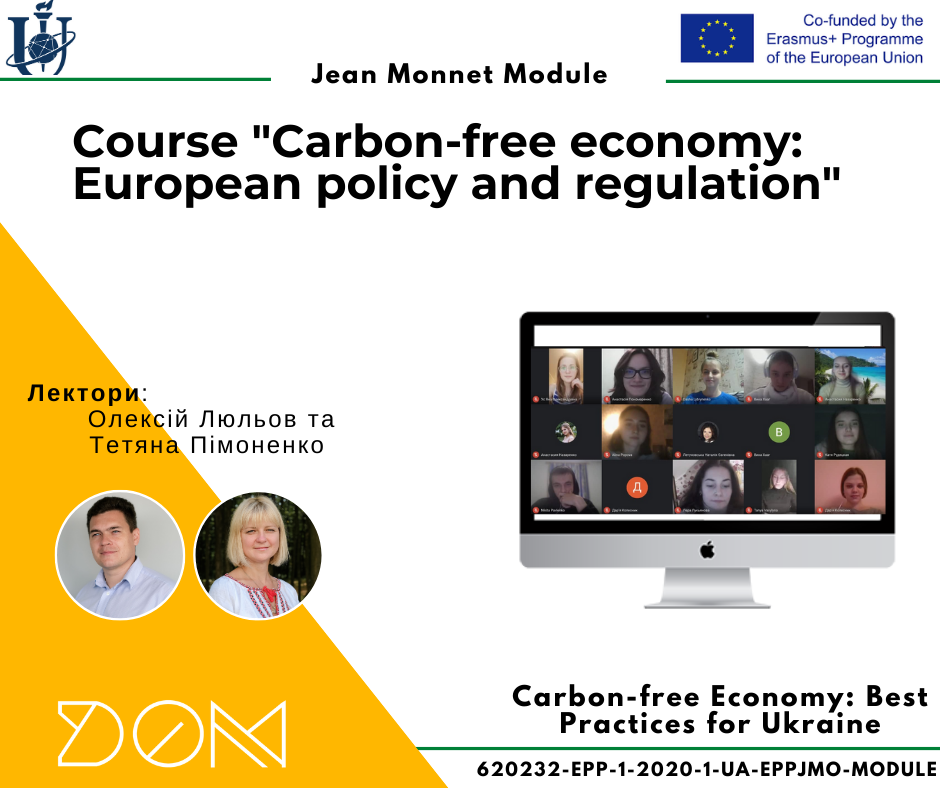
Training: Green Finance Platforms
In early December, invited speaker Oleksii Lyulyov and co-executor of the Jean Monnet Module “Carbon-Neutral Economy: Best Practices for Ukraine” (620232-EPP-1-2020-1-UA-EPPJMO-MODULE) Tetyana Pimonenko conducted a training on “Green Financing Platforms” for marketing students.
They spoke about the available opportunities and features of finding investment resources for the implementation of green initiatives from the European Bank for Reconstruction and Development, the European Investment Bank, OECD, the World Bank, etc. In addition, the speakers emphasized the need to adhere to the principles of transparency and publicity when obtaining green investments for the implementation of projects.
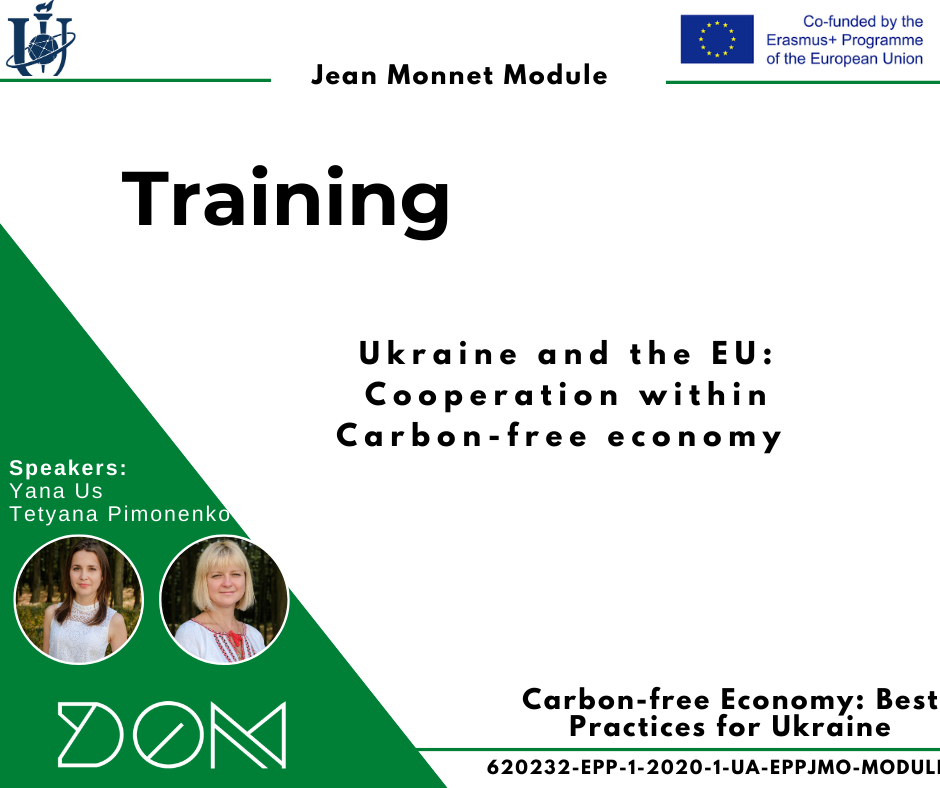
Carbon-neutral economy: European policy and regulatory framework
In early May, Tetyana Pimonenko and guest lecturer Oleksii Lyulyov gave lectures for students of Sumy State University “Carbon-neutral economy: European policy and regulatory framework”. About 30 students of various specialties took part in the online lectures. Students learned about the CO2 emissions trading system in the EU countries, the European Climate Pact, etc.
In addition, students had the opportunity to discuss the prospects for the implementation of the European Green Deal and the EU Climate Strategy for 2020-2050.
This online lecture was held as part of the course “The EU Cohesion policy for Carbon-free economy”, which is implemented in accordance with the Jean Monnet Module “Carbon-neutral economy: best practices for Ukraine” (620232-EPP-1-2020-1-UA-EPPJMO-MODULE). Upon completion of this course, students will receive certificates according to the learning outcomes.
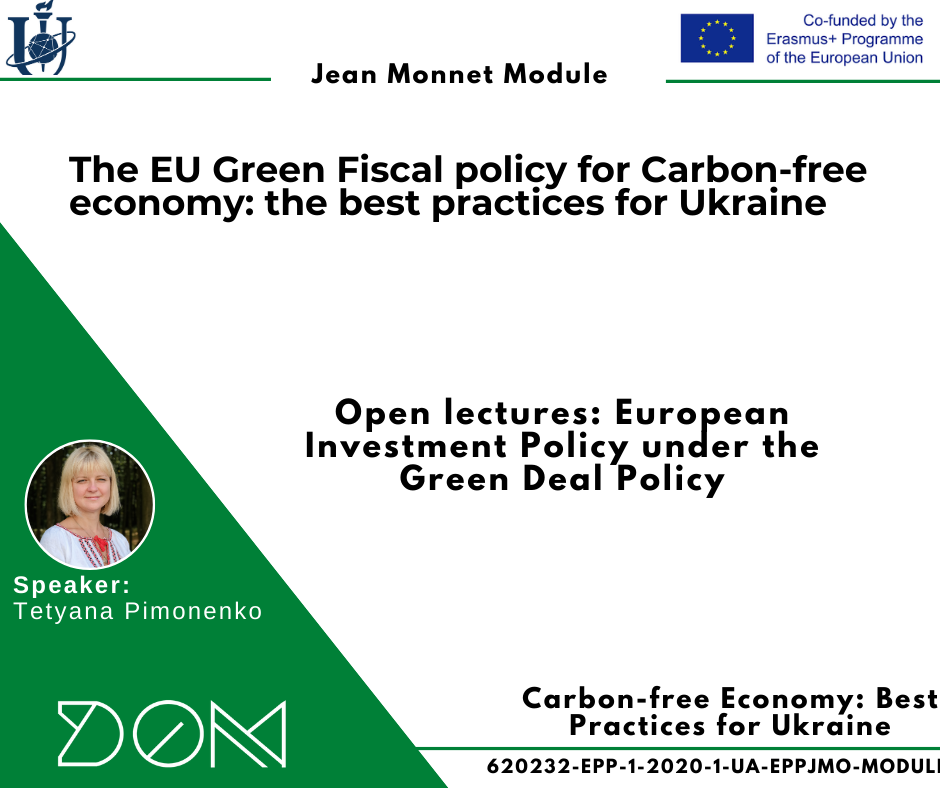
Training: Ukraine and the EU: Collaboration in the Transition to a Carbon-Neutral Economy
The implementers of the Jean Monnet Module “Carbon-free economy: best practices for Ukraine” (620232-EPP-1-2020-1-UA-EPPJMO-MODULE) Tetyana Pimonenko and Yana Us conducted an online training for master’s and postgraduate students of various specialties on possible areas of cooperation between the EU and Ukraine in the transition to a carbon-neutral economy.
The participants were divided into project groups, which, using brainstorming, built maps of cooperation between the EU and Ukraine in the framework of the transition to a carbon-neutral economy. Based on the results of the discussions, an optimal map of cooperation between the EU and Ukraine in the transition to a carbon-neutral economy was built.
The training was conducted as part of the course “The EU Cohesion policy for Carbon-free economy”, which is implemented in accordance with the Jean Monnet Module “Carbon-neutral economy: best practices for Ukraine” (620232-EPP-1-2020-1-UA-EPPJMO-MODULE). All training participants received certificates according to the results.
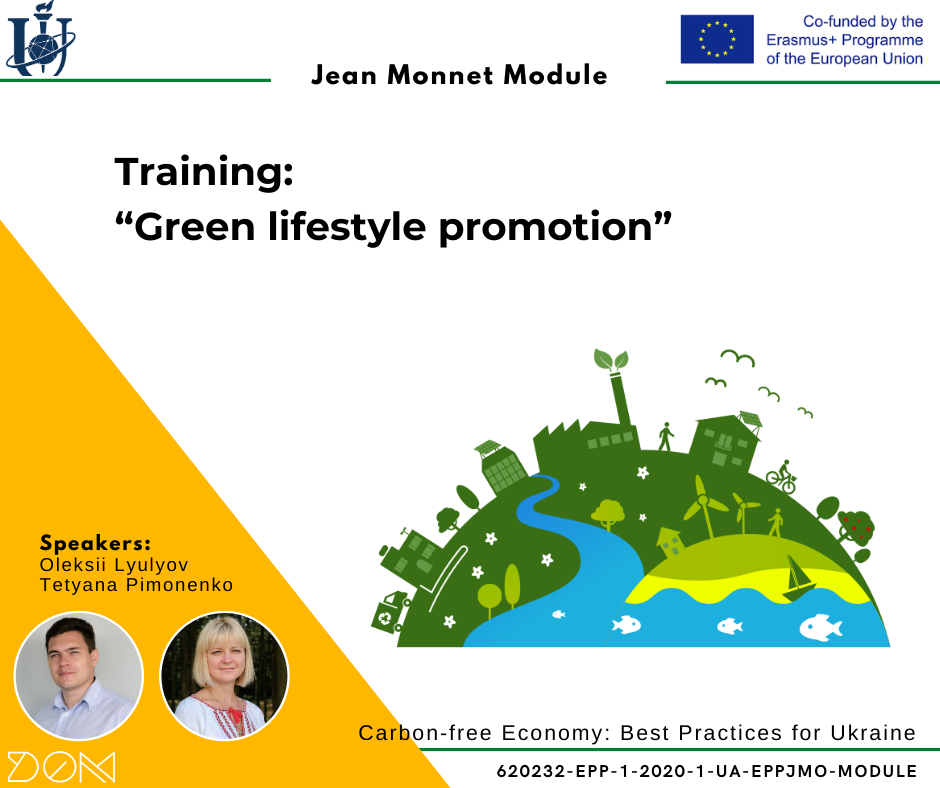
European investment policy within the framework of the Green Deal Policy
From November to December, the co-executor of the Jean Monnet Module “Carbon-neutral economy: best practices for Ukraine” (620232-EPP-1-2020-1-UA-EPPJMO-MODULE), Tetyana Pimonenko, conducted a course of lectures “European investment policy within the framework of the Green Deal Policy”. Tetyana focused her lectures on the following aspects:
- carbon footprint of investments and socially responsible investment;
- new trends and mechanisms of the European investment plan within the framework of the EU Green Deal Policy;
- EU trade policy and sustainable development.
These lectures were implemented within the course “The EU Green Fiscal policy for Carbon-free economy: the best practices for Ukraine”. Upon completion of this course, students will receive certificates according to the learning outcomes







